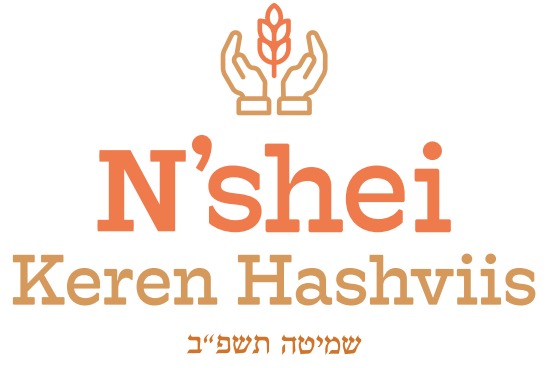Gila Arnold
For the over two thousand women in Jerusalem’s Binyanei Haumah hall last Sunday night, the moment was unforgettable.
Picture the scene:
The large auditorium is packed to the gills with women: Chareidi, Chassidish, American seminary girls, and more. The MC of the event, Rebbetzin Rina Tarshish, announces the entrance of the evening’s guests of honor, and as the band strikes up the music – Kulam Ahuvim, Kulam Berurim, Kulam Gibborim – they begin to come in: The Gibborot Hakoach – the Shmitah-observant farmers’ wives.
They walk in tentatively at first, dazzled by the music, the lights, and, most of all, the sheer size of the audience. These are simple women, used to solitary farm life, not massive crowds.
And then, what happens next takes their breaths away. As one, the entire audience rises, in a prolonged standing ovation. The farmers’ wives continue streaming in, more and more of them, and the applause becomes increasingly intense. Some of the women wear tichels and skirts, others pants and no hair covering – but every one of them is a hero.
And right now, they all have tears in their eyes. Because for many of them, this is the first time that they realize it.
Giving Koach to the Gibborot Koach
When the N’shei Keren Hashviis decided to make this historic large-scale women’s Shmitah event, their goal was twofold: to connect women around the world to the mitzvah of Shmitah by inspiring us with the farmers’ awesome emunah; and to give chizzuk to the farmers’ wives themselves.
Yet even they didn’t realize just how badly that chizzuk was needed.
Nechama, one of the N’shei Keren Hashviis volunteers, relates that when she spoke to some of these farmers’ wives to invite them to the event, they didn’t understand why women around the country would come out to celebrate them.
“I said, ‘Do you know that you’re a hero, a Gibborat koach, and that you even have the koach to give brachos?’ They had no idea!”
One farmer’s wife, who came with her daughter, said that after the event, her daughter said to her, “Now I understand what Abba’s doing and why it’s so important.”
They came from moshavim across the country – from the north down to the Gaza border in the south. One of the women was due to give birth that week; she said, “I kept davening that I would hold out long enough to come!”
The women and their daughters were treated to a special pre-event dinner, where they had a chance to meet the other farmers’ wives. For so many of these women, keeping Shmitah was a private decision, and a lonely struggle. For many, they are the only Shmitah-observant farmers on their moshav, and they’re viewed not as heroes, but as oddities. Suddenly, they found themselves in a warm, embracing community of women who could appreciate exactly who they were and what they were going through.
Yehudis, another volunteer, describes a sweet exchange at this dinner that could only happen in a room full of farmers. A farmer’s wife from Moshav Dalton asked Yehudis about the grapes on the fruit platter. “Has the new season for grapes already started? Should I be making Shehechiyanu?”
“I have no idea,” she replied. Then, looking around the room, she found the wife of a farmer who grows grapes. “Go ask her!”
That farmer’s wife was able to clarify that no, the new season hadn’t started yet. Either way, she said, with her expert eye, “These grapes come from chutz la’aretz.”
Yehudis spoke to many of the farmers’ wives after the event and described their overwhelming feedback.
“They kept thanking us for bringing them. They were hugging and kissing me. So many said, ‘I had no idea that other people value so much what we do!’ The word they all kept repeating was ‘otzmah’, power. This was a powerful event, and gave them tremendous chizzuk to keep going.”
Who are they?
That was the question that thousands of us came out that evening to have answered: who are these women, and from where do they get their deep wellsprings of emunah? How do they have the strength to willingly step aside and let their land lie fallow for an entire year? To go without income, to watch their debts pile up, and to know that they’ll need to rely on the generosity of others just to be able to feed their children?
(Though, of course, it’s not generosity; as R’ Shia Markowitz emphasized in his stirring speech about the mitzvah and the power of Shmitah, it is the chiyuv, the responsibility of all of Klal Yisrael to support these farmers, who are keeping Shmitah on behalf of us all.)
We watched a moving documentary, shot last summer, in which Jamie Geller met with farmer couples, who discussed their decision to keep Shmitah and their feelings as the year approached. In a typical story, Avraham Yaakov, who is keeping Shmitah for the first time, related,
“I’d closed a deal with a tractor company to buy a new tractor; I gave them a down payment. All of the companies I’d worked with until now were asking me to double or even triple the amount of produce I was giving them.”
As his wife, Ilanit, nods along with tears in her eyes, Avraham continues, “But it took me only five minutes to decide I’m keeping Shmitah.”
Avraham does not wear a kippah, yet we do not need to hear him describe himself as a “maamin” – nor to hear Ilanit cry, “I don’t know how we’ll manage! But I’m with him, I’m with him all the way” – to understand that these are Jews with a level of emunah most of us would envy.
After watching the documentary, Jamie Geller welcomed onstage the women featured in the documentary, to hear how they were doing now that they were midway through the Shmitah year. As we listened to them speak, and heard them talk about their pride in being able to keep this challenging mitzvah, the mystery deepened.
Who are these women who look so simple; who, if we were to pass some of them on the street, we might dismiss as “not one of us”, and yet who have taken on a spiritual challenge that most of us wouldn’t be able to handle?
These are women who don’t even know their own strength. They were taken aback by the outpouring of admiration and, especially, by the requests for brachos. Like celebrities, after the event was over, each farmer was surrounded by women and girls thanking them for their sacrifice and requesting a bracha.
“They were asking me!” several of them exclaimed. “These chareidi women wanted a bracha from me!”
In one of the most poignant scenes of the evening, we heard the stories of two Chassidish women, both teachers. Last Shmitah, their school had taken a trip to the farm of Doron and Ilana Toweg, who were keeping Shmitah for the first time. Both of these women were in need of a yeshua, having waited a long time for a second child. Unbeknownst to them, their colleagues wrote their names down for Ilana to daven for them – despite the fact that Ilana protested that she didn’t have any special powers, that it was her husband keeping Shmitah, not her.
Within the year, they both celebrated the brises of their new babies – on the same day.
The stories would have been moving enough on their own; yet it was what happened next that brought the house down. Some backstory: last Shmitah, when Ilana first heard about these two stories, the outcome of her brachos, that was what led to her realization that observing Shmitah indeed carries real power – and to her determination to use that power for the good of Klal Yisrael. Ilana now spends hours every Friday night after candle lighting davening for thousands of people in need of a yeshua.
Yet, Ilana never actually knew who these two women were who’d benefitted from her bracha. Until this evening.
To arrange a surprise for Ilana, the staff of N’shei Keren Hashviis spent six weeks tracking down these two women. After they succeeded in discovering their identities, the women agreed to record their stories for the event – but didn’t want to appear personally. Then, just a few days before the event, they changed their minds, overcoming their personal hesitations in order to make the greatest possible Kiddush Hashem.
At the event, Ilana was called on stage, and as the women’s pre-recorded stories started to play, she burst out in tears. Then, as the stories finished, and the two women themselves walked onto the stage, Ilana was beside herself. She ran over and hugged them, to loud, emotional applause, as each of the women took the opportunity to thank her publicly.
A week after the event, Ilana reported, “I’m still shaking!”
Who are these women? They’re women just like us, with their ups and downs, their triumphs and struggles. And yet, they’re women who dug deep inside themselves and summoned the strength to do something superhuman – just because it’s ratzon Hashem.
And for that, they’re heroes.
The Power of Achdus
Rabbanit Yemima Mizrachi started off her address to the farmer’s wives by asking, “Who else here feels that Moshiach is standing right now at the gates of Binyanei Haumah?”
Based on the reactions of the crowd, she wasn’t the only one.
“I’m 42 years old, and this was probably one of the most ruchniyus experiences of my entire life,” says Shoshana, a member of the audience. “I was crying for two-and-a-half hours straight.”
She says the inherent achdus of the event was particularly powerful. “We saw them up on stage, some of them with their jeans and no hair coverings – people we’d look down on as not frum. And we realized, these are giants! They’re accomplishing what we can’t! I was literally waiting for Moshiach to come through the door.”
Indeed, there was a strong sense of spiritual koach in the air, of Geula on the threshold. R’ Shia Markowitz spoke about how this year’s Shmitah, the largest in modern history, was the first time since the Churban that the majority of privately-owned Jewish land was Shmitah-observant.
And when Yemima Mizrachi, in the middle of her speech, asked everyone to take a moment right now to harness the bracha in the room and daven for their personal or national redemption, the ensuing silence in the 2,000-plus audience was electric with power.
The koach was real. One of the farmer’s wives related that she experienced a big yeshua the very next day. She and her family had been struggling so badly that they didn’t even have enough money for basic groceries. The day after the event, she suddenly received an offer to take on a second job, which would cover their shortfall.
Shoshana shared a personally moving bracha that she’d received. Her husband suffers from MS and she asked one of the farmers’ wives for a bracha for his refuah shelaimah.
“That’s all I said. My husband’s name, for refuah shelaimah. I didn’t say anything about the nature of his illness.”
After they walked away, her friend who was with her turned to her excitedly. “Did you hear what she said?”
The farmer’s wife had given her husband a bracha that “hu yakum al raglav” – that he should stand on his own feet.
“She didn’t even wear a head covering,” Shoshana marveled. “But she had such a koach!”
For their own part, the farmers’ wives came away extremely affected by the sight of thousands of Chareidi women paying them tribute and demonstrating their appreciation, gratitude and respect.
Ayala, a farmer’s wife, described how meaningful this event was for her. “I decided to come at the last minute; I had no idea what to expect. But it was so worth it! The achdut was unbelievable; we all spoke with each other, we understood each other, we joined together. Every woman needs chizzuk, each in our own area – and we all came away strengthened. It’s the achdut that gives us that strength.”
She added that the farmers’ wives kept talking about how special the evening was, and how grateful they were to N’shei Keren Hashviis for organizing it. “Every detail that went into it – the music, the dinner, the arranged transportation, the gift – all of it made this event into such an experience. It gives us the strength to go on!”
Yehudis relates that the farmers’ wives kept talking about how much chizzuk they received. “They’re begging us to make more events!”
And the feeling is mutual. Women around the world who missed out on the historic event are asking for more as they, too, want the opportunity to connect to this uniquely powerful mitzvah.
The Zechus of Women
The evening culminated with each farmer’s wife coming up on stage to receive a special gift – a silver necklace that said, “Neshot Yisrael Itach” – the women of Klal Yisrael are with you. (One woman related afterwards that her husband advised her not to wear it, but rather to keep it safe in its box, like a treasure, so she could save it for future generations.)
Then, while all the farmers’ wives stood on stage, the audience sang a song, led by musical producer Tammy Hein, with lyrics written by Miriam Israeli especially for the event. Against the backdrop of a dramatic, gorgeous video of hundreds of seminary girls singing and dancing in Shmitah-observant fields, the farmers’ wives smiled and cried and grasped each other’s hands as the hall thundered with the words (sung to Avraham Fried’s Pashut Anashim): Hamitzvah titkayem, hachalom titgashem/bizchutchen, gibborot ha’umah – The mitzvah will be fulfilled and the dream come true, thanks to you, the heroines of our nation… Emunah that will bring the final Geula – b’zchut hanashim.
In the zechus of women.
This was the theme of the evening. It’s the koach of women that enables their husbands to keep Shmitah. It’s the koach of all of the women of Klal Yisrael – both our emotional and our financial support – that gives these heroic women the strength to keep up this challenging yet powerful mitzvah.
And, ultimately, it will be in all of our zechus – the zechus of the nashim tzidkaniyos of our generation – that the final Geula will come. B’motza’ei Shviis Ben David Ba.
To donate to the global women’s Dollar a Day Shmitah campaign: nsheikerenhashviis.org
To get a replay of the Worldwide Event or to find out about bringing an event to your community, contact: [email protected]











